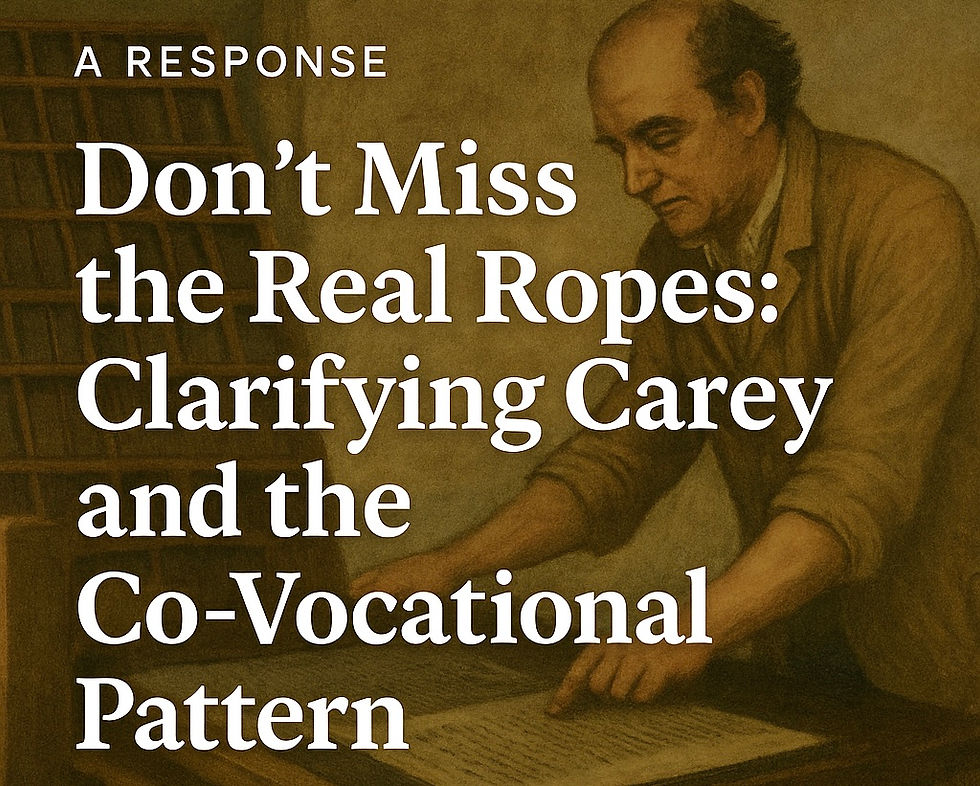More Than Ropes: Why Mission Needs Formation More Than Funding
- Nathan Elliott
- Aug 4, 2025
- 3 min read
by Nathan Elliott

Dave Miller’s article, “Empowering Missionaries Like Carey,” struck a chord. His call to equip rope-makers rather than merely hold the ropes is compelling—and deeply needed. I agree with his core message: sustainable mission requires more than support. It requires equipping leaders who can thrive where they’re planted.
But I believe the conversation needs to go a step further. The future of missions isn’t just about models—it’s about identity. It’s not primarily about whether someone can support themselves financially, but whether they’re formed to carry the weight of the gospel wherever they go.
Missions Doesn’t Suffer From a Lack of Access—It Suffers From a Lack of Formation
It’s never been easier to get on a plane. It’s never been easier to wire funds across the world. And it’s never been easier to feel like we’re doing our part because we’re “supporting” someone else to go.
What’s hard today isn’t sending or supporting—it’s becoming or building the kind of person who can carry mission forward with depth, durability, and gospel integrity. We don’t just need missionaries who can function—we need missionaries who can embody. People who are spiritually resilient, vocationally competent, and personally responsible for the gospel wherever they land.
The modern missions dilemma isn’t one of logistics—it’s one of identity.
The Pitfall of Passive Sending
Here’s the uncomfortable truth: sometimes support becomes a substitute for obedience.
Writing a check can become a way of outsourcing our responsibility to make disciples. We’ve professionalized the Great Commission to the point where local believers quietly excuse themselves, assuming mission is for “the called” or “the trained.”
But the call to mission is not proxy—it’s personal. Wherever God calls us—across the street or across the ocean—we’re called to more than rope-holding. We’re called to cross-carrying.
From Support to Formation
That’s why I want to press even deeper than Carey’s ingenuity or Priscilla and Aquila’s example. The central question isn’t whether someone can survive in a foreign economy. The central question is: Are they ready to lead?
And that kind of readiness doesn’t happen by accident.
What if the church’s primary role in mission wasn’t funding, but formation?
What if we didn’t just measure readiness by support letters but by suffering, skill, and character?
Some mission dollars might be better spent on training someone to lead than sustaining someone who isn’t ready.
Context Demands Competency
We can’t keep sending generically trained workers into complex global cultures. We have access to real-time cultural data, economic realities, and religious landscapes. We should train accordingly.
If the region prizes hospitality, we should send people who live open-handed.
If the local economy is agricultural, we should send people who can farm.
If the spiritual climate is hostile, we should send people who’ve suffered and can suffer again—faithfully.
We’re not just looking for passion. We’re looking for preparation.
From Heroes to Co-Laborers
Too often we send missionaries as heroes to be funded rather than co-laborers to be equipped. The difference is subtle—but essential.
One waits for help when the funds run dry.
The other creates solutions from within.
One depends on the system.
The other contributes to the ecosystem.
We need missionaries who take responsibility—not just for their survival, but for their witness, their neighbors, and the church they hope to see multiplied.
A New Era for Sending
This generation has more tools, access, and global mobility than any before it. But those advantages alone don’t produce fruit. In fact, they heighten the need for discernment and depth.
It’s time to move:
Beyond funding and into formation.
Beyond presence and into preparation.
Beyond emergency response and into empowered responsibility.
Let’s not ask, “How do we hold their rope better?”
Let’s ask, “Have we helped them carry their cross?”
That’s how we move from merely sending missionaries… to sending leaders.




Comments